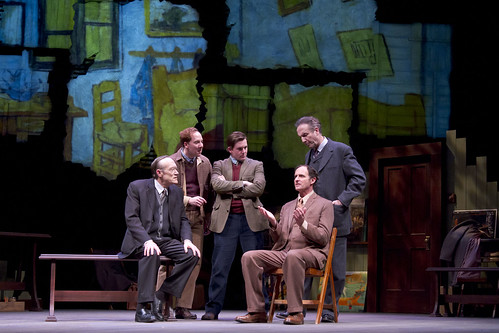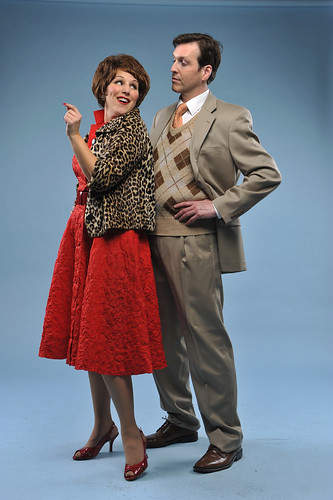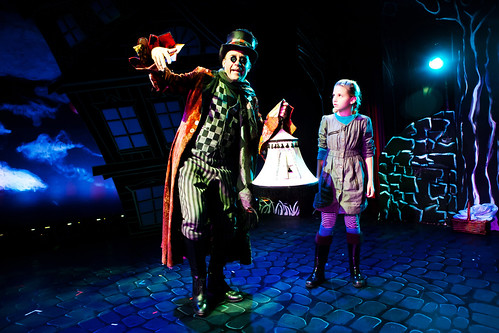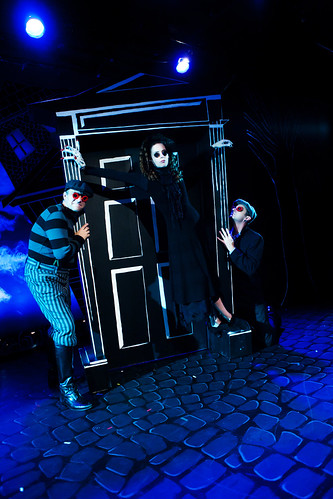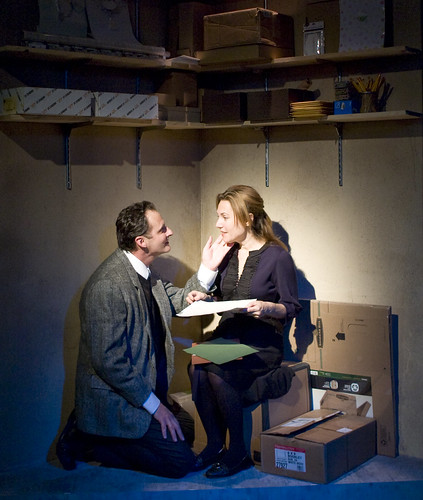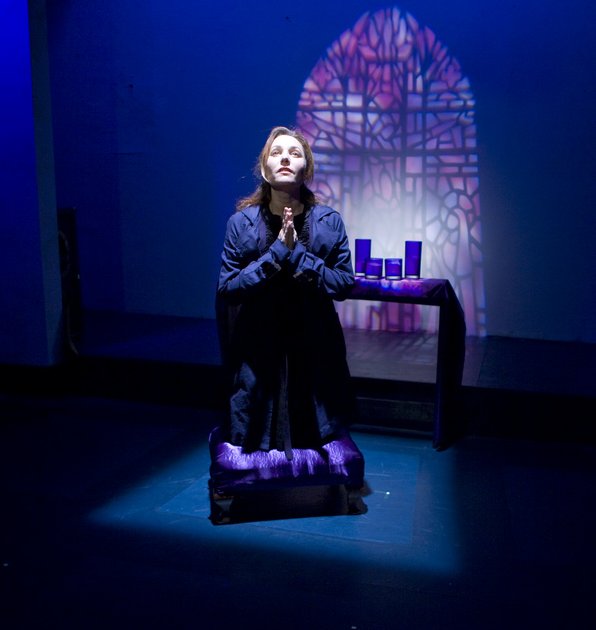Young journalist Raina (Anna Ishida, right) arrives at Mama Sid’s (Annemaria Rajala) ashram to reveal the secrets of the world-renowned spiritual teacher’s past in the world premiere of The Fourth Messenger by Tanya Shaffer and Vienna Teng. Below: Sid’s father Sunny (Will Springhorn, Jr., center) and his neighbors sing about Bois Riche, the town he built to keep his daughter safe. Photos by Mike Padua
Beautiful, ambitious and with the kind of depth we’ve come not to expect from musicals, The Fourth Messenger is a triumph. This world-premiere work is not perfect…yet. But if any new homegrown musical were even half this good it would be considered a major success.
With a book by Tanya Shaffer, music by Vienna Teng and lyrics by both creators, The Fourth Messenger wants to tell an epic story in an intimate way, and in the most essential ways, that works. Shaffer’s book brims with intelligence and wit and Teng’s music feels rich in original ways, full of melody and intricacy captured expertly by musical director Christopher Winslow and his four-piece orchestra (the cello and woodwinds are especially expressive).
Director Matt August’s thoughtful yet robust production at the Ashby Stage in Berkeley has some rough edges, but it works because the story is strong. Taking a cue from other religious tales-turned musicals like Godspell or Jesus Christ Superstar, The Fourth Messenger turns to one of the greatest stories ever told, but this time it’s the life of Buddha that comes singing to the stage.
Shaffer has re-imagined young Siddhartha as Sid Arthur, a woman destined to change the lives of many on the planet. As we see from the cover of Time magazine, Mama Sid, as she is known by her followers, is a celebrity guru. She has carefully shielded certain parts of her life story from her minions, and that has piqued the interest of Raina, a journalist at Debunk Nation, who will go undercover at Mama Sid’s Newfoundland compound and uncover all the dirt.
Still grieving from the recent death of her father, Raina’s visit will turn out to be surprising on a number of fronts, more personal than professional. And what’s most interesting about this tale, which adheres fairly closely to Buddha’s life, from his exposure to the four messengers (sickness, old age, death and hope) to his visitation by temptations as he seeks spiritual nirvana.
Along the way we get some spirited numbers, like “Monkey Mind,” an ode to silent meditation and the brain’s resistance to quiet, and “Bois Riche,” a flashback look at Sid’s childhood in a gated community created to shield her from the inevitable horrors of the world. There are also sterling ballads, like Raina’s “The Story Is Mine,” which is reprised to great effect several times (especially at the end) and Sid’s “Force of Nature.”
Working with choreographer Bridgette Loriaux, director August keeps the show moving at quite a clip (running time is just under 2 1/2 hours). Set designer Joe Ragey helps considerably with a simple but elegant set of wood and white (nicely lit by Steven B. Mannshardt) that conveys the wintry landscape of Mama Sid’s ashram and easily becomes many other locations.
Act 2 falls into soap operatics, which can be rewarding, but we also lose sight to some degree of Mama Sid’s empire and how followers are so anxious to deify their gurus, who are, after all, only human. There’s an interesting question here: if someone’s teachings are powerful and effective, does that person’s personal life and personal choices – whether we know about them or not—disqualify the teaching in any way? Or the teacher?
Those questions get subsumed by the Sid-Raina relationship, and that’s understandable, but some aspects of the larger story here are still waiting to be told (or sung).
That said, what’s here is compelling from beginning to end. The balance between humor and drama is nicely maintained, and the cast, in spite of some vocal limitations, rises to most of the score’s challenges. Anna Ishida as Raina effectively conveys barely contained rage and hurt, and Annemaria Rajala is commanding and almost ethereal as a highly believable Mama Sid. Among the spirited ensemble, Reggie White, Jackson Davis, Barnaby James, Will Springhorn Jr. and Cathleen Riddley all have standout moments.
By the final song, “As Long as I Am Living/Look to the Thought (Reprise),” the power of this story and Teng’s music combines in such a way that makes musical theater the best possible choice for this re-telling of an ancient tale. A smart producer will see the potential in this show – so abundantly displayed in this production – and help take it to the next level. It’s time for The Fourth Messenger to attain and share its own nirvana with a much wider audience.
[bonus interview]
I interviewed Tanya Shaffer and Vienna Teng about the creation of The Fourth Messenger for the San Francisco Chronicle. Read the feature here.
FOR MORE INFORMATION
The Fourth Messenger by Tanya Shaffer and Vienna Teng continues through March 10 at the Ashby Stage, 1901 Ashby Ave., Berkeley. Tickets are $23-$40. Visit thefourthmessenger.com.





